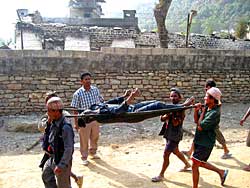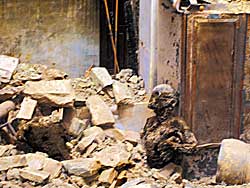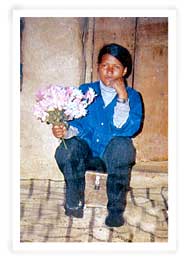 It is the morning after in Beni and a scene of utter devastation. The police station is a blackened wreck. The barbed wire had been clipped away and the perimeter wall blasted open at several points. Sandbags at the sentry posts are torn to shreds. Near the army base, a woman is washing the bloodstain from the steps outside her shop, while her daughter looks on.
It is the morning after in Beni and a scene of utter devastation. The police station is a blackened wreck. The barbed wire had been clipped away and the perimeter wall blasted open at several points. Sandbags at the sentry posts are torn to shreds. Near the army base, a woman is washing the bloodstain from the steps outside her shop, while her daughter looks on. The police and soldiers guarding the police base fought from 10:30 on the night of Saturday, 20 March, until six the next morning against thousands of Maoists, until their ammunition ran out. Those who survived either fled, or were taken prisoner. Down the road, the soldiers at the army base kept fighting till daylight and most of their casualties took place in the morning.
 Next door, the CDO building has been reduced to rubble, and is still smouldering. The street outside is littered with spent ammunition and unexploded bombs. People pick their way around in silence, their faces covered, glancing at the grotesquely disfigured Maoist corpses that lie strewn about.
Next door, the CDO building has been reduced to rubble, and is still smouldering. The street outside is littered with spent ammunition and unexploded bombs. People pick their way around in silence, their faces covered, glancing at the grotesquely disfigured Maoist corpses that lie strewn about. The army camp is the only government building to survive partially intact, although it was nearly overrun at one point. Some 25 mortar rounds and a rocket landed here, fired from the mountains above. Whoever decided to put the district headquarters here at the confluence of the Kali Gandaki and Myagdi wasn't thinking of security.
Lt Col Ragu Nepali's office with its sandbagged windows is a wreck. He estimates there were at least 5,000 Maoists involved in the attack: frontline fighters, militia and porters. "They came in waves, like the sea, one after another, one after another," said Lt Col Nepali, looking exhausted after two nights without sleep. "There were more women than men. And many, many child soldiers, below 14. I saw them while I was shooting back." There were six Maoist bodies inside the army base and Nepali points them out: "They are all young children, this one is a girl."
 The rebel force had started infiltrating the town at about 8:30, just after the curfew. The attack itself started at 10:30, when the mortar and automatic rifle fire started from the hills above. Local people said that it came as a complete surprise and there had been no sign of preparation inside the town. A witness, who asked not to be named, describes watching the rebels operating in the street below his home. "Half-an-hour after it started, the place was full of Maoists," he says. "They were carrying bombs that way, and carrying casualties back."
The rebel force had started infiltrating the town at about 8:30, just after the curfew. The attack itself started at 10:30, when the mortar and automatic rifle fire started from the hills above. Local people said that it came as a complete surprise and there had been no sign of preparation inside the town. A witness, who asked not to be named, describes watching the rebels operating in the street below his home. "Half-an-hour after it started, the place was full of Maoists," he says. "They were carrying bombs that way, and carrying casualties back." Beni's citizens shut themselves inside their homes, hiding under beds to the sounds of gunfire and explosions all night and into the next morning. While the fighting raged along the road leading to the CDO's office, the police station and the barracks, the rest of the town was under complete Maoist control.
 "The children were watching the Maoists running in the streets below," said one eye witness. "They were a little afraid at first but after that they watched in fascination. The Maoists were taking time to eat chow chow and asking for drinking water from the houses. They didn't do anything to the public."
"The children were watching the Maoists running in the streets below," said one eye witness. "They were a little afraid at first but after that they watched in fascination. The Maoists were taking time to eat chow chow and asking for drinking water from the houses. They didn't do anything to the public." The Maoists were carrying pressure cookers as assault charges, on long bamboo poles to be placed against the walls of their targets. Casualties were carried back on stretchers and in dokos. Some Maoists took medical supplies from a local pharmacy to treat the wounded.
"Until ten the next morning they were moving around freely," said another eye witness. "One Maoist was even carrying messages back and forth by bicycle. After the sun came up, they were walking here like they were coming home from a movie. Singing, joking, showing no fear."
 The witnesses said they saw up to 70 casualties, either dead or injured. The children were used at night, but by morning they had been replaced by adult fighters. "The children were like 14-15 years old," said another resident.
The witnesses said they saw up to 70 casualties, either dead or injured. The children were used at night, but by morning they had been replaced by adult fighters. "The children were like 14-15 years old," said another resident. At around 8:30 on Sunday morning a witness in the bazar saw 10-15 of the captured policemen being led away to the north with their hands tied behind their backs.
Towns people said a helicopter flew over Beni at around 2AM, but it couldn't do much. The fighting was house-to-house and in the middle of the town, which is located at the bottom of a deep gorge. Attacking from the air, would have meant heavy civilian casualties. It was not till 9 o'clock on Sunday morning that the Maoists began to move off and the army's helicopters returned to chase them away. But the first helicopter landed at the parade ground on the banks of Kali Gandaki only on Sunday afternoon.
 The army says many rebels were killed by the helicopters that pursued them, and at one point the entire hill above Beni was in flames as the aerial strafing of fleeing Maoists continued. Helicopters were landing regularly by Monday, whipping up blinding dust storms on the parade ground. They were flying in fresh troops and picking up others for the cordon and search operations that seemed to be concentrated to the south of Beni.
The army says many rebels were killed by the helicopters that pursued them, and at one point the entire hill above Beni was in flames as the aerial strafing of fleeing Maoists continued. Helicopters were landing regularly by Monday, whipping up blinding dust storms on the parade ground. They were flying in fresh troops and picking up others for the cordon and search operations that seemed to be concentrated to the south of Beni. Even on Monday, the people of Beni looked shellshocked. Some were cautiously venturing outdoors, looking at the damage. Opposite the CDO's office stood the house of Netra Bahadur Mahat, a Nepali Congress activist, which was used as a guest house. The Maoists had come and taken everyone out and set fire to the building. Two people who were hiding inside were burnt to death, their charred remains still inside the ruins of the house.
Not far away, next to the army camp is a school. Its furniture and doors were broken and the walls pock-marked with bullet holes. A few children had begun returning to investigate the damage to their classrooms. Behind one the Maoists had left a socket bomb and an assault charge the size of a football.
 Among the weapons and clothes left behind by the Maoists were three photo albums retrieved from the pockets of dead Maoists. They showed mothers and fathers, pictured outside their village homes. Smiling young people stood in fields wearing Dasain garlands. There is a picture of a handsome young man, posing on a boat at Phewa Lake. Other pictures were of Maoists posing together, smiling and brandishing weapons. One photo showed a young woman holding a bunch of flowers and, on the facing page, a young man's conventional studio shot, with 'I love you' written across it in English.
Among the weapons and clothes left behind by the Maoists were three photo albums retrieved from the pockets of dead Maoists. They showed mothers and fathers, pictured outside their village homes. Smiling young people stood in fields wearing Dasain garlands. There is a picture of a handsome young man, posing on a boat at Phewa Lake. Other pictures were of Maoists posing together, smiling and brandishing weapons. One photo showed a young woman holding a bunch of flowers and, on the facing page, a young man's conventional studio shot, with 'I love you' written across it in English. The last remaining bodies of security personnel were being ferried out by helicopter on Monday afternoon, but the bodies of the Maoists still lay rotting in the ditches and along the roads. Human rights observers and reporters had started arriving, and there were reports coming in from outlying villages that civilians were among those killed as helicopter gunships fired at retreating Maoists.
 The operations were still going on and there was a lot of helicopter activity. At the parade ground, a group of grim faced commandos was climbing aboard an Mi-17 bound for Baglung. A group of women wailed from the edge of the field as the bodies of dead police and soldiers were being loaded up for the flight to Pokhara.
The operations were still going on and there was a lot of helicopter activity. At the parade ground, a group of grim faced commandos was climbing aboard an Mi-17 bound for Baglung. A group of women wailed from the edge of the field as the bodies of dead police and soldiers were being loaded up for the flight to Pokhara. Outside Pokhara airport on Monday police and army families were crouching in the shade, watching the bodies being unloaded from the helicopters. There was bomb damage to a bridge along the road and the trees felled across the way were still being cleared. In a village along the road, a funeral was being prepared.


